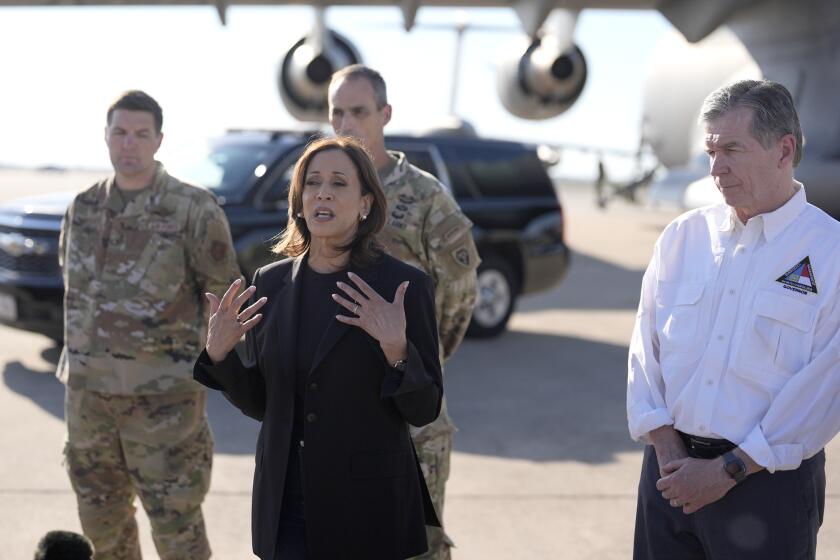Slovenia Hit With Army Ultimatum : Yugoslavia: Rebellious republic ordered to cease resistance or face ‘decisive military action.’ Threat raises fears troops may be acting outside government control.
The Yugoslav army Saturday ordered the rebellious republic of Slovenia to cease its war of resistance to federal intervention or face “decisive military action” that would crush its proclaimed independence.
The ultimatum issued in Belgrade appeared to confirm Slovenian fears that the army is acting outside government control in its effort to subjugate the secessionist republic.
“We are at the beginning of civil war,” Gen. Marko Negovanovic of the army high command declared in a televised broadcast that broke into regular late-night programming.
Negovanovic accused Slovenia’s territorial defense force of waging a “dirty, cruel and deceitful war” on the Yugoslav People’s Army, which sent tanks and planes to pound tiny Slovenia after it declared its independence from Yugoslavia on Tuesday.
Slovenia’s Parliament was called into emergency session after a 12-point list of demands from the army was presented to republic leaders, insisting that all impediments to federal army operations be removed as part of a Western-brokered cease-fire.
Nervous Slovenian militiamen in flak jackets and armed with submachine guns fanned out across the capital, Ljubljana, at midnight, sealing off key government buildings and reinforcing barricades that have blocked the city’s approaches for three days.
Federal air force jets again screeched over the capital, and gunfire could be heard through the night.
The army warning heightened fears of an even more punishing assault on the defiant republic, which has already absorbed a bloody two-day offensive by the Serbian-led federal forces trying to wrest control of airports and border crossings from the Slovenes.
Hundreds of casualties have been reported from the clashes, which continued sporadically even after the Friday night cease-fire.
A halt to the fighting was officially accepted by both the Slovenes and the army after three European foreign ministers announced during a short visit that they had negotiated a plan to resolve Yugoslavia’s age-old and myriad crises.
Under the terms of the agreement brokered by envoys from Italy, Luxembourg and the Netherlands, the republics of Slovenia and Croatia were to have put off secessionist acts for three months, Serbia was to end its blockade of the federal presidency and the Yugoslav army was to retreat to its garrisons on Slovenian soil.
All three demands remained unheeded Saturday, as each of the combatants interpreted the accord differently and added conditions.
“I can see no democratic way through which Slovenia can be part of Yugoslavia,” Slovenian President Milan Kucan told a news conference. “It can only be annexed.”
In response to Slovenian accusations that he had sold out the republic, Kucan said he had simply agreed to put off some remaining steps to full sovereignty that would have taken months to implement even without the accord.
Kucan and Foreign Minister Dimitrij Rupel said they told a European Community delegation that visited Zagreb late Friday that they could never abandon the independence drive because Slovenes had died for the cause.
The Serbian leadership of Communist President Slobodan Milosevic had agreed to let Croatia’s Stipe Mesic be inaugurated as president, but he amended the concession to make resurrection of the ruling body contingent on Slovenia and Croatia first rescinding their declarations of independence.
The rotating presidency has not functioned since May 15, when Serbia organized a boycott of Mesic. State-run Serbian media have branded him a fascist, making it unlikely that the Milosevic regime will ever back down and endorse him as head of state.
Currently, with no federal president, the 180,000-man federal army lacks a clear line of command.
The federal government in Belgrade has also been severely undermined. Prime Minister Ante Markovic ordered the army to secure Slovenia’s borders after the sovereignty declaration, giving military hard-liners a mandate for the bloody assault delivered on Slovenian militiamen and civilians.
Federal troops and armored vehicles launched markedly fewer attacks on the Slovenian forces Saturday but made no moves to pull back from the border facilities that the Yugoslav constitution says are the responsibility of the individual republics.
Slovenian Information Minister Jelko Kacin said federal forces were still fighting Slovenian militia at several border crossings and that combat aircraft had raided the town of Hrvatini near the border with Italy.
“The army is still not respecting the truce,” Kacin said, although conceding that the battles were less intense than they had been during the previous two days.
Italian police told reporters that fighting near the border checkpoint at Skofije killed three federal soldiers Saturday. Witnesses said the fighting began when Slovenes surrounded an armored personnel carrier.
Slovenian authorities cut electricity and other supplies to federal garrisons after the army unleashed its attack on the wayward republic early Thursday.
Among the demands made in the army ultimatum was restoration of all necessary aid and services to military facilities.
“If the leadership of the republic of Slovenia does not fulfill these demands . . . the High Command will order measures in accordance with the situation in the country, including maximum raising of combat readiness of the Yugoslav People’s Army, the necessary mobilization measures and decisive military action,” Negovanovic said.
He said the republic of Croatia, which also declared independence last week, was mobilizing its military and would face the same consequences if it refused to disarm.
The official Yugoslav news agency Tanjug reported renewed ethnic violence in Serbian-dominated regions of Croatia. At least five died in the clashes, raising the death toll in the republic to at least 35 in less than two months.
As the fate of Yugoslavia looked ever more precarious, the State Department said Saturday that American citizens in Slovenia and Croatia should leave those areas as soon as possible.
More than 1,000 foreign tourists were evacuated by boat from Yugoslavia to the Italian port of Trieste.
Other foreigners have been advised by their governments to remain inside their hotels to avoid injury in the event of hostilities.
In Washington, Deputy Secretary of State Lawrence S. Eagleburger said in a televised interview that the situation in Yugoslavia remains extremely volatile.
“There is a real danger of a real civil war with a lot of people, innocent people, being killed,” Eagleburger said, adding that Washington and Belgrade “must do everything we can to prevent that.”
Eagleburger, who served as U.S. ambassador to Yugoslavia from 1977 to 1981, said that “one of the problems may well be that the central government has lost most of its authority over the republics.” As a result, it may not feel that it can stop the breakaway republics by any other means than force, he said on CNN’s “Evans and Novak” show.
Eagleburger denied that Secretary of State James A. Baker III had “given a green light” for the use of force when he said last week that Washington would “not reward unilateral actions that prevent dialogue and the possibility of negotiated solutions.”
“We have within recent times made it very clear that we think what’s going on with regard to the force used by the Yugoslav national army is reprehensible and must be condemned,” said Eagleburger. But, he added, the dissolution of Yugoslavia into separate ethnic republics “has to be done in a way that leads to a peaceful settlement, because otherwise you’re going to kill thousands of people.”
At the same time, Eagleburger tread lightly around one of the central dilemmas of the Bush Administration’s policy toward Yugoslavia: its encouragement of democratic movements within the ethnic republics that make up Yugoslavia, but its opposition to the kind of separatism that could result in a violent breakup.
“It is absolutely essential for a different configuration in Yugoslavia, that the sovereignty of those republics and their democratic, market-oriented process must continue,” said Eagleburger.
“We are against the use of force to maintain the federation as it now exists,” Eagleburger added. “We’re against the use of force, period, but what we want is a new confederation.”
But while Eagleburger said that civil war is not inevitable, he appeared less than optimistic about the prospects of heading one off. “I would be the last to sit here and tell you I am absolutely confident it can be” contained, Eagleburger said, noting that his represented a personal assessment, not an official Administration position.
Times staff writer Melissa Healy, in Washington, contributed to this story.
More to Read
Sign up for Essential California
The most important California stories and recommendations in your inbox every morning.
You may occasionally receive promotional content from the Los Angeles Times.









